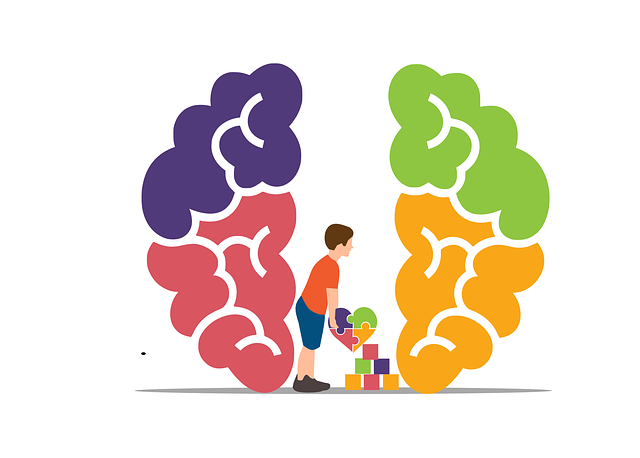Evaluating Englewood Chronic Pain Therapy (ECPT) involves a blend of qualitative and quantitative methods, focusing on tracking pain levels, medication use, functionality, and mental wellness outcomes. Patient feedback and the Risk Assessment for Mental Health Professionals are crucial in identifying challenges like therapist burnout, fostering continuous improvement, and optimizing chronic pain management. By incorporating participant input, ECPT can refine program design, enhance mood management strategies, build resilience, and tailor treatment plans to individual needs, significantly enhancing overall mental wellness outcomes.
Mental wellness program evaluations are crucial for measuring effectiveness and driving improvement. This article explores three essential methods for assessing the impact of Englewood Chronic Pain Therapy, focusing on Assessing Program Impact through specific metrics, Participant Feedback for gaining valuable insights, and Continuous Improvement strategies leveraging evaluation data. By examining these aspects, we aim to enhance services tailored to the unique needs of individuals navigating chronic pain in Englewood.
- Assessing Program Impact: Methods and Metrics for Englewood Chronic Pain Therapy
- Participant Feedback: Voice and Perspective in Mental Wellness Program Evaluation
- Continuous Improvement: Using Evaluation Data to Enhance Englewood Chronic Pain Therapy Services
Assessing Program Impact: Methods and Metrics for Englewood Chronic Pain Therapy

Evaluating the impact of programs like Englewood Chronic Pain Therapy (ECPT) is crucial to understanding their effectiveness and making informed improvements. This involves a systematic approach using both qualitative and quantitative methods. One key metric is measuring changes in participants’ pain levels, medication use, and overall functionality before and after the program. Additionally, mental wellness outcomes such as mood management and burnout prevention strategies for healthcare providers can be assessed through surveys and interviews, providing insights into participants’ subjective experiences and improvements.
The Risk Assessment for Mental Health Professionals plays a significant role in ECPT evaluation by identifying potential challenges faced by therapists. This includes assessing the program’s ability to mitigate therapists’ burnout, a critical aspect of maintaining long-term mental wellness within the healthcare sector. By combining these assessment methods, ECPT can effectively gauge its impact on both patients and care providers, fostering continuous improvement and ensuring optimal outcomes in managing chronic pain.
Participant Feedback: Voice and Perspective in Mental Wellness Program Evaluation

Participant feedback is an invaluable component of evaluating mental wellness programs, offering a direct line to the voices and perspectives of those directly impacted by these initiatives. At Englewood Chronic Pain Therapy, for instance, patient input has been instrumental in refining their program design. By actively soliciting feedback from participants, therapists gain insights into the effectiveness of various interventions, including anxiety relief techniques and pain management strategies. This iterative process allows for continuous improvement, ensuring that mental health education programs are tailored to meet the unique needs and preferences of each individual.
Incorporating participant feedback into the evaluation framework of Mental Wellness Coaching Programs Development fosters a more holistic understanding of program success. It enables therapists to identify not only what works but also how these interventions resonate with diverse populations. This approach, highlighted in mental health education programs design, encourages a dynamic and adaptive methodology, where learning and growth are fostered through authentic collaboration with those seeking support.
Continuous Improvement: Using Evaluation Data to Enhance Englewood Chronic Pain Therapy Services

Englewood Chronic Pain Therapy services can significantly benefit from adopting a continuous improvement approach, leveraging evaluation data to enhance their offerings. Regularly assessing patient outcomes allows for identifying areas where adjustments are needed. For instance, through detailed surveys and feedback mechanisms, therapists can gain insights into patients’ experiences with mood management strategies and resilience-building techniques. This information is invaluable for refining treatment plans and tailoring them to individual needs.
By utilizing evaluation data, Englewood Chronic Pain Therapy can foster inner strength development by understanding what interventions resonate best with different patient profiles. Such a targeted approach ensures that each individual receives the most effective support, ultimately leading to better pain management and improved mental wellness outcomes.
The evaluation of mental wellness programs, such as the Englewood Chronic Pain Therapy initiative, is multifaceted. By combining robust assessment methods like measuring program impact through various metrics and gathering participant feedback, we gain valuable insights into service delivery. Integrating these data-driven approaches enables continuous improvement, ensuring that programs like Englewood Chronic Pain Therapy remain effective and responsive to the evolving needs of their participants. This holistic evaluation strategy not only enhances individual well-being but also fosters a dynamic, adaptive mental health care ecosystem.














